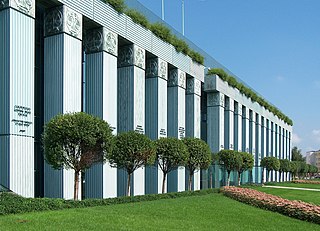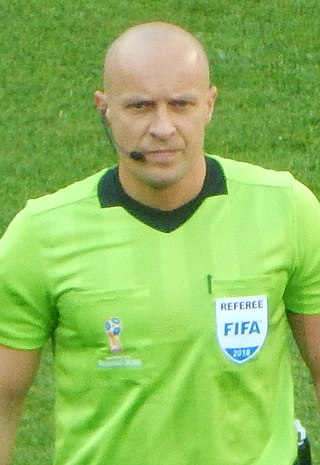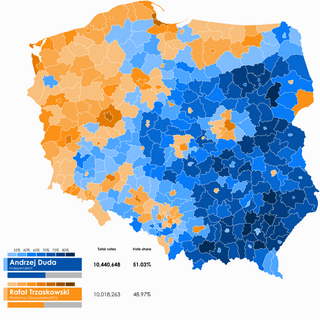
Law and Justice is a right-wing populist and national-conservative political party in Poland. Its chairman is Jarosław Kaczyński.

Poland does not legally recognize same-sex unions, either in the form of marriage or civil unions. In 2012, the Supreme Court ruled that same-sex couples have limited legal rights in regards to the tenancy of a shared household. A few laws also guarantee certain limited rights for unmarried couples, including couples of the same sex. Same-sex spouses also have access to residency rights under EU law.

The Supreme Court is the highest court in the Republic of Poland. It is located in the Krasiński Square, Warsaw.

The Constitutional Tribunal is the constitutional court of the Republic of Poland, a judicial body established to resolve disputes on the constitutionality of the activities of state institutions; its main task is to supervise the compliance of statutory law with the Constitution of the Republic of Poland.

Stefan Michnik was a military judge of the Soviet-dominated regime in post-World War II Poland, and a captain in the communist Polish People's Army. He was involved in the politically-motivated arrest, trial, imprisonment and/or execution of a number of Polish anti-communist fighters and activists. Many of those persecuted by Michnik also fought against Nazi Germany during World War II, as members of the Polish resistance.
The judiciary of Poland are the authorities exercising the judicial power of the Polish state on the basis of Chapter 8 of the Constitution of Poland. As in almost all countries of continental Europe, the Polish judiciary operates within the framework of civil law.

Szymon Marciniak is a Polish football referee. He is considered one of the best rated international referees of his generation. He has refereed the 2022 FIFA World Cup final between Argentina and France, the 2018 UEFA Super Cup between Real Madrid and Atlético Madrid, and the 2023 UEFA Champions League final between Manchester City and Inter Milan. In 2023 and 2024, he was named "The World's Best Referee" by the International Federation of Football History & Statistics (IFFHS).

The Committee for the Defence of Democracy, CDD is a Polish-born civic organization and NGO which among its goals includes promoting the European values, especially democracy, rule of law, and human rights. It was founded in November 2015 by a group of citizens including Mateusz Kijowski, in anticipation of the Polish constitutional crisis, 2015. The organization declares its independence of any political parties and that it has no intention to transform into one. It is opposed to the actions of the government led by the Law and Justice (PiS) party.

The Polish Constitutional Tribunal crisis has been an ongoing political conflict in Poland starting in the second half of 2015 over the appointment of five of the 15 judges of the Constitutional Tribunal.

Presidential elections were held in Poland on 28 June 2020. As no candidate received a majority of the vote, a second round was held on 12 July, in which incumbent president Andrzej Duda, running with the support of Law and Justice, faced off against Civic Platform vice-chairman and Mayor of Warsaw Rafał Trzaskowski. In the second round Duda was re-elected for a second term with 51% of the vote, becoming the first incumbent to win re-election since Aleksander Kwaśniewski in 2000.

The Open Dialogue Foundation (ODF), formerly known as the Open Dialog Foundation,, is an international non-governmental organization, founded in 2009 in Poland and currently headquartered in Brussels, Belgium, that conducts research and advocacy on human rights and the rule of law in the post-Soviet area and – since 2018 – within the European Union.

Jacek Robert Sasin is a Polish politician and former local government official.
Since 2017, a series of protests against judiciary reforms have occurred in Poland. Since Law and Justice took power in Poland in 2015, its influence rapidly extended to the judicial branch, through contended nominations that produced the 2015 Polish Constitutional Court crisis. The Law and Justice party argues that the reforms are needed to improve the efficiency of the judiciary, but the opposition, supported by a significant number of members of the judiciary, has been very critical of the reforms. The reforms have also been criticized by a number of international bodies. The European Commission invokes the Article 7 of the European Treaty against E.U. member Poland, denouncing recent judiciary reforms putting it under the political control of the ruling majority and citing "serious risk [to] the independence of the judiciary and the separation of powers".

The 2023 Polish parliamentary election took place on Sunday, 15 October 2023, per the Polish Constitution. Seats in both the lower house, the Sejm, and the Senate were contested. At the polls, a referendum - containing four questions concerning economic and immigration policy of the government - was also voted on.
Szymon Hołownia's Poland 2050 is a centrist to centre-right political party in Poland.

Wojciech Sadurski is a Polish and Australian scholar of constitutional law. As of 2023, he is Challis Professor in Jurisprudence at the University of Sydney and Professor in the Centre for Europe in the University of Warsaw.

The 2020–2021 women's strike protests in Poland, commonly called the Women's Strike, were anti-government demonstrations and protests in Poland that began on 22 October 2020, in reaction to a ruling of the Constitutional Tribunal, mainly consisting of judges who were appointed by the ruling Law and Justice dominated United Right, which tightened the law on abortion in Poland. The ruling made almost all cases of abortion illegal, including those cases in which the foetus had a severe and permanent disability, or an incurable and life-threatening disease. All-Poland Women's Strike was charged by the authorities for having illegally organised the protests.
The Polish constitutional crisis, also known as the Polish rule-of-law crisis, is a political conflict ongoing since 2015 in which the Polish government has been accused of failing to comply with European and Polish constitutional law. The 2015 elections resulted in the Law and Justice party winning control of both the presidency and the parliament. With this government trifecta, PiS used its power to appoint judges to the Constitutional Tribunal in 2015, leading to the 2015 Polish Constitutional Court crisis. The government of Poland continued to expand its hold on the judiciary resulting in the 2017 Supreme Court crisis, and the 2019 Polish judicial disciplinary panel law. These events allowed the legislature and executive of the Polish government to have de facto control over judges and their appointments.
Presidential elections will be held in Poland by 18 May 2025, though they can be held earlier should the office become vacated as a result of death, resignation or removal from office of the incumbent. Due to constitutional term limits allowing a president to serve only two terms, incumbent president Andrzej Duda is ineligible for re-election. Presidential elections in Poland must take place on a free day between 75 and 100 days before the term's end.

On December 19, 2023, Bartłomiej Sienkiewicz, the Minister of Culture and National Heritage in Poland, dismissed the then-current state media directors and their supervisory boards, most notably those of public broadcaster Telewizja Polska (TVP), appointing new ones in their place. The move was met with criticism and accusations of illegality by the dismissed management and the opposition Law and Justice (PiS) party, causing a parliamentary intervention in the TVP headquarters.
















